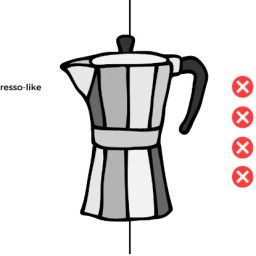
When browsing the coffee aisle, you might notice that many creamers labeled as “non-dairy” list ingredients like sodium caseinate. These are known as milk derivatives. Understanding these ingredients is crucial because they can impact dietary choices and health, especially for those with specific dietary restrictions or allergies.
Key Takeaways about What Is A Milk Derivative In Coffee Creamer
- Milk Derivatives in “Non-Dairy” Creamers: Surprisingly, sodium caseinate, a milk derivative, is often found in products labeled as non-dairy.
- Impact on Consumers: Even trace amounts of milk proteins in these derivatives can affect individuals with allergies or those following a vegan diet.
- Labeling Confusion: The terms “non-dairy” and “dairy-free” can be misleading as regulatory definitions might still allow for the inclusion of milk derivatives.
What are Milk Derivatives?
Milk derivatives are substances derived from milk during the processing of dairy products. Common derivatives include:
- Casein: A type of protein that provides texture and stability in processed foods.
- Whey: Another protein used in various food products, from protein supplements to baked goods.
How Are They Used?
Milk derivatives are utilized primarily for their functional properties in food production:
- Texture and Stability: Casein is popular in non-dairy creamers for its ability to improve texture and mixability.
- Nutritional Value: Whey is often added for its high protein content.
The Role of Milk Derivatives in Coffee Creamers
Milk derivatives, particularly sodium caseinate, play a pivotal role in the composition of many coffee creamers, including those labeled as non-dairy. Understanding why manufacturers rely on these ingredients reveals much about the complexities of food labeling and product formulation.
What are Milk Derivatives?
Sodium caseinate, the most common milk derivative found in coffee creamers, is derived from casein, a protein in milk. This ingredient is crucial for its ability to enhance texture and stability in liquid products, making it a preferred choice for creamers.
Why Use Milk Derivatives in Non-Dairy Products?
The use of milk derivatives like sodium caseinate in non-dairy creamers can seem contradictory, but it centers around the functional benefits these derivatives provide:
- Texture and Consistency: Sodium caseinate helps achieve a rich, creamy texture in creamers, mimicking the mouthfeel of dairy without using actual milk or cream.
- Solubility: It dissolves well in both hot and cold beverages, making it ideal for blended drinks.
Labeling Practices
The term “non-dairy” can be confusing. In regulatory terms, “non-dairy” products can actually include milk derivatives, as long as they contain less than 0.5% milk by weight. This is why you will often find sodium caseinate listed in the ingredients of non-dairy creamers.
Dietary Considerations and Milk Derivatives
Milk derivatives like sodium caseinate play a significant role in the composition of many food products, including coffee creamers. However, their presence can impact different consumer groups, such as vegans, those with lactose intolerance, and individuals with milk allergies. Let’s explore these impacts and look into alternatives that cater to these dietary needs.
Impact on Vegans: Vegans avoid animal products for ethical, environmental, or health reasons. Milk derivatives, as animal-derived products, are not vegan. Consumers who follow a strict vegan lifestyle need to be vigilant about reading labels to avoid milk derivatives commonly found in products labeled as “non-dairy.”
Impact on Lactose Intolerants: Lactose intolerance involves difficulty digesting lactose, the sugar found in milk. While some milk derivatives, like lactose-free casein, might be tolerable, they can still cause discomfort to those who are highly sensitive. For individuals with lactose intolerance, it’s important to understand the specific type of milk derivative used in a creamer to assess its potential impact.
Impact on Those with Milk Allergies: For individuals with milk allergies, avoiding milk derivatives is crucial as they can trigger allergic reactions. Milk derivatives contain milk proteins like casein and whey, which are allergens. Products containing these ingredients should be strictly avoided by anyone with a milk allergy.
Alternatives to Milk Derivatives
Fortunately, there are numerous alternatives to milk derivatives in coffee creamers that cater to vegans, those with lactose intolerance, and milk allergies:
- Plant-Based Creamers: Made from almond, soy, coconut, oat, and rice, these creamers are naturally dairy-free and do not contain milk derivatives.
- Lactose-Free Creamers: Specifically formulated without lactose, these can be suitable for those with lactose intolerance, but careful label reading is still necessary to avoid other milk derivatives.
- DIY Creamers: Homemade creamer recipes allow for complete control over ingredients, ensuring they are free from unwanted milk derivatives.
FAQs
Can People with Lactose Intolerance Consume Products with Milk Derivatives?
While milk derivatives like sodium caseinate are often processed to remove most of the lactose, trace amounts can still remain. This means that individuals with lactose intolerance might experience varying degrees of discomfort depending on their sensitivity level. It’s always best to proceed with caution and perhaps consult a healthcare provider if unsure.
Are Milk Derivatives Considered Vegan?
No, milk derivatives are not considered vegan as they are derived from milk, an animal product. Vegans looking for coffee creamer should seek out options specifically labeled as vegan, which will exclude all animal-derived ingredients.
What Does “Non-Dairy” Really Mean on a Label?
“Non-dairy” can be a misleading term. According to regulatory guidelines, “non-dairy” products can actually contain milk derivatives, provided they contain less than 0.5% milk by weight. Therefore, “non-dairy” does not necessarily mean dairy-free or free from milk derivatives.
Final Thoughts
Navigating the world of coffee creamers, especially when considering milk derivatives, can be tricky due to varying dietary needs and misleading labels.
Always check the ingredient list for milk derivatives, especially if you have allergies, are lactose intolerant, or follow a vegan diet. Know the difference between “non-dairy” and “dairy-free” as these terms are not synonymous and can impact selection based on your dietary restrictions.
Plenty of plant-based creamers are available that are free from milk derivatives, catering to vegans and those with milk allergies or lactose intolerance. If unsure about how a product may affect your health, consulting with a dietitian or healthcare provider can provide personalized advice.









